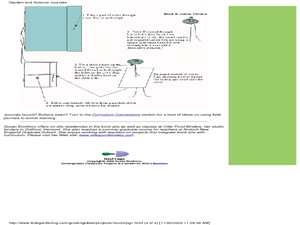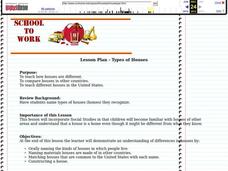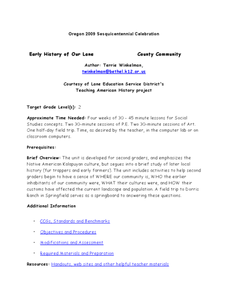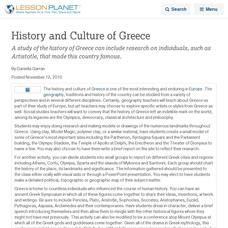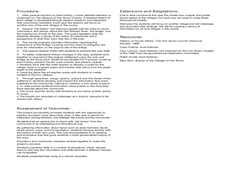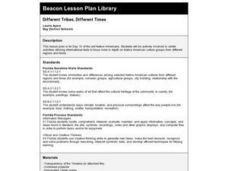Teaching Tolerance
Identity Artifacts Museum
Who are you? It's a simple question, but younger learners have the opportunity to express their complex identities by making artifacts that represent parts of their identities. After engaging in the activity, they share who they are with...
American Institute of Physics
African American Inventors in History
A two-part lesson introduces young historians to the work of famous African American inventors. Groups first research and develop a presentation of an inventor that includes biographical information and information about one of their...
Curated OER
Quarter Coin Cookies
Students study the historical figures and symbols of U.S.
patriotism depicted on the penny, nickel, dime, and quarter coins. They explore the processes involved in making coins, and how metals canchange in consistency from the...
Curated OER
Let's Meet The Presidents
Create a digital movie documenting research about an American President. Using internet sources, students with special needs gather information about their chosen president. Working in groups, they use this information to create a...
Curated OER
Create a World
Students combine imaginative powers with known map-making techniques to create a whole new world.
Curated OER
A Dinosaur Scavenger Hunt
Students explain what a fossil is, learn six dinosaurs and tell one characteristic about each, then describe verbally what a dinosaur might have looked like.
Curated OER
Christopher Columbus
Help first graders gain an understanding of the beginnings of our nation by learning more about Christopher Columbus. They begin by listening to a read aloud of Christopher Columbus and His Voyage to the New World (another title...
Curated OER
Making Field Journals
Students follow a bookmaking format to create a book and use it as a garden journal. In this science journal lesson, students follow book making directions to create a garden and science journal.
Curated OER
Talking Rocks
Third graders explain the difference between Petroglyphs and Pictographs from Ancient Native American peoples. They create symbols that are representative of a story about their world.
Curated OER
Salt Marsh in a Pan
Students create a model of a salt marsh to discover the impact of pollution and human activities on water-based habitats including bays and the ocean. They recognize the relationship between natural and developed areas. Students impact...
Curated OER
Our community-in sculpture form
Students design tiles that represent their community. They discuss ideas with another class through email. They then create the tiles, fire them, and attach them to a masonite board to create a community mural.
Curated OER
Types of Houses
Students orally name the kinds of houses in which people live. They name materials used in building houses in other countries. They construct a house.
Curated OER
Early History of Our Lane
Second graders study Native American Kalapuya culture. In this American History lesson, 2nd graders discover the early inhabitants of their community. They take a field trip to Dorris Ranch.
Curated OER
History and Culture of Greece
A study of the history of Greece can include research on individuals, such as Artistotle, that made this country famous.
Curated OER
History and Culture of Turkey
An exploration of the history and culture of Turkey can provide students with a greater understanding and appreciation of this region.
Curated OER
History and Culture of Russia
The history and culture of Russia is one of the most complex in Europe, and can provide interesting learning opportunities.
Curated OER
Rockin? Chalk (Integrating science - make own chalk)
Students use plaster of Paris, talc, and cornstarch to create their own chalk. They hypothesize what mixture of ingredients produce the "best" chalk. Students discuss what they think are the characteristics of the "best" chalk.
Curated OER
Sense of Place: No River Too Wide-Bridges
Fifth graders discover the history of their hometown Des Moines River. In this U.S. Geography lesson students speak with Iowans that tell stories of the settlers and early villages near the Des Moines River. Students document...
Curated OER
Extra! Extra!
Young scholars describe how plants and animals depend on each other. They see how living and nonliving environments change over time. They identify ways in which humans have changed their environment and the effects of those changes.
Curated OER
Different Tribes, Different Times
Second graders study the different types of Native American culture groups. They, in groups, visit four different work stations to examine various culture groups and complete a Corn Cycle worksheet.
Curated OER
Basics of Archaeology
Students identify what and how to complete an Archaeological excavation is conducted. They identify the transition from one layer to the next more easily if the colors of the layers are different. When creating a dig, the teacher...
Curated OER
International Festival: Mexico
Young scholars explore the culture of Mexico through music and food. In this multicultural instructional activity, students read the book Mexico and listen to samples of Mexican music. Young scholars use ingredients to make tacos.
Curated OER
Amazing Desert Dwellers
Students explore the many adaptations desert animals have made to survive in their challenging habitat. They use this information to invent new creatures well-suited for desert life.
Curated OER
Science of Special Effects
This is a creative, multidisciplinary, well-designed lesson provided by Scientific American related to special effects. Students make their own animated short films and use math and computer skills.
Other popular searches
- Elementary Art Clay
- Art Clay
- Ancient Egyptian Art Clay
- Art Clay Sculpture
- Solar System Art Clay
- Art Clay Projects
- Art Clay Gargoyles
- Art Ceramics Clay
- Clay Art Hands
- Art Clay Coil
- Clay Art Pottery
- Art Clay Head









